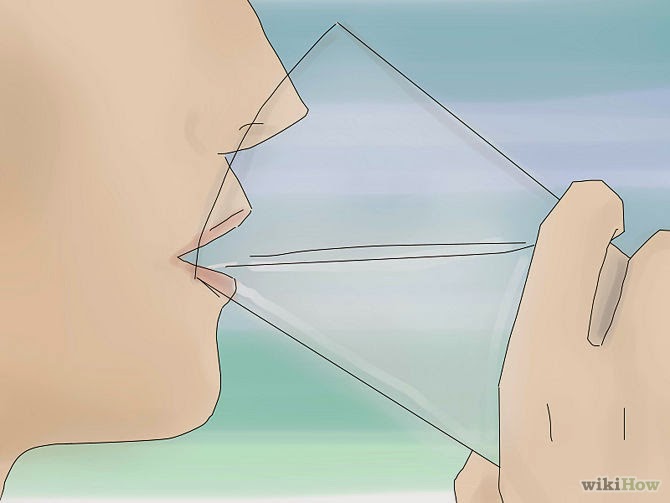Tips How to Be Healthy - Many people with serious illnesses would give anything for a single day
of perfect health. After all, it's only when you lose your health that
you realize what you once had. To be healthy and make the most of what
you've got, follow these recommendations.
1.Drink more water.
Adult humans should drink a liter or more water per day. That is in
addition to things like tea and coffee. Water keeps bodies at the
correct temperature and removes toxins that are the inevitable result of
metabolism and industrial life. You'll be healthier automatically.
- Water also clears your skin, helps your kidneys, helps to control your appetite, and keeps you energized.[1] If being healthier, more wakeful, and having better skin isn't motivation, what is?
- In addition, it keeps you from drinking unhealthy beverages like soda and juice, which are high in calories. The body barely registers the intake of these unhealthy drinks and yet you still feel thirsty hundreds of calories later. If you need the taste, splash some lemon, lime, or 100% juice into your water. However, be sure that you are drinking a sufficient amount of milk to maintain the strength of your bones into old age.
2.Eat breakfast. A light,
healthy breakfast is sufficient enough to reap the benefits of eating
early. If it's comprised of lean protein and whole grains, then it will
keep you from gorging at lunch. Research shows that breakfast-skippers
actually eat more! So, to curb your appetite, don't skip the first meal of the day. Turns out it is the most important!
- Instead of two chocolate doughnuts and a coffee that's more cream than actual coffee, opt for eggs, fruit, and for a beverage: skimmed milk, fresh orange juice, or tea. The healthier your breakfast is, the more energized you'll feel throughout the day and the more you won't need to eat later in the day.[2]
3. Eat well throughout the day. If half of your plate is vegetables and fruit, you're on the right track.[3]
Add in lean protein, low-fat dairy, and whole grains. Once a steady
eating pattern has been established, your body will feel more
comfortable. There may be a period of time when your body is wondering
where the sugary foods went, but once you're over the hump, you'll feel
better than ever.
- Remember that not all fats are bad for you. Good fats can be found in oily fish like salmon and tuna, avocados, nuts, and olive oil. These are essential to a well-balanced diet. Read How to Eat Healthy for more tips.
4. Eat at the right times. A good time for a healthy, easy-to-digest evening meal is between 5p.m. and 8p.m.; it's best to avoid late night snacks because they fill you with unnecessary calories and can disrupt your sleep. If you do need that midnight snack, stick to unsalted nuts, seeds, fruits, and veggies.
- Snacking isn't bad for you if you do it right. In fact, eating "constantly" can keep you from feeling deprived and going for that third piece of cheesecake when the cart rolls around. Just make sure it's all in moderation.[4]
5.Go a little meatless. In case you haven't noticed, meat hasn't played much of a role in what we've talked about so far. Being vegetarian
is a good way to reduce your calorie intake and get loads of vitamins
and minerals, but that being said, it can be done wrong. While it's not
the best idea to go fully vegetarian, most people do eat far too much
meat. A good idea is to change the amount and types of meat you eat:
swap pork chops for lean chicken; steak for tuna.
- A high-fiber diet is easily had without meat. Fiber has been shown to lower your cholesterol, control your blood-sugar levels, improve your bowel health, and make you less likely to overeat. The recommended fiber intake is 30 grams a day for men and 21 for women; after the age of 50, this jumps up to 38 for men and 25 for women. Some good sources of fiber include fruits and vegetables (with the skin), whole grains, and legumes.[5]
6. Read the labels.
Processed foods get a bad rap, and often for good reason. However,
you've got to choose your battles. That frozen bag of broccoli isn't
nearly as bad as that boxed mac and cheese (if you can really call it
that). In short, avoid processed foods when you can — but if you can't,
read the labels and watch for added bad stuff: salt, sugar, and fat.
- Food that stays on the shelves often has added sodium, words that
end in -ose, and trans and saturated fats in the ingredient list. If you
see these on the label (especially if they're in high amounts), avoid
them. You can find a healthier alternative elsewhere. It's not worth it.
- Just because it says it has no trans fat doesn't actually mean it has no trans fat. Funny how that works, eh? Negligible amounts can be legally ignored — so if you see hydrogenated vegetable oil on the list, you've found one of the masked culprits.[6]

No comments:
Post a Comment